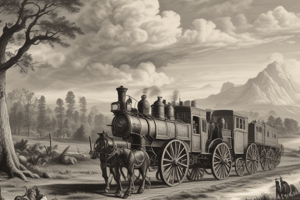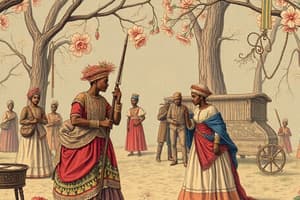Podcast
Questions and Answers
What was the main issue that bothered the nullifiers, as Jackson called them?
What was the main issue that bothered the nullifiers, as Jackson called them?
- Federal government's interference in states' rights
- Abolition of slavery
- Expansion of federal power (correct)
- Rise in slave revolts
What did the ordinance of nullification passed by South Carolina in November 1832 refuse to obey?
What did the ordinance of nullification passed by South Carolina in November 1832 refuse to obey?
- Compromise tariff bill
- State laws
- Federal government's tariffs (correct)
- The institution of slavery
Why did South Carolina believe that talk from the federal government regarding the abolition of slavery could not be allowed?
Why did South Carolina believe that talk from the federal government regarding the abolition of slavery could not be allowed?
- To promote human rights
- To maintain economic stability in the South (correct)
- To enhance political power in slave states
- To prevent the spread of infectious diseases
What did President Jackson threaten to do if any state nullified federal law?
What did President Jackson threaten to do if any state nullified federal law?
What were the primary economic bases of the Northern and Southern states during Andrew Jackson's administration?
What were the primary economic bases of the Northern and Southern states during Andrew Jackson's administration?
Why did Calhoun resign from the office of Vice President during the Nullification Crisis?
Why did Calhoun resign from the office of Vice President during the Nullification Crisis?
What was a major point of disagreement between the Northern, Southern, and Western states regarding economic policies?
What was a major point of disagreement between the Northern, Southern, and Western states regarding economic policies?
What power did the South Carolina legislature gain through the ordinance of nullification?
What power did the South Carolina legislature gain through the ordinance of nullification?
Why did Western interests seek an alliance with Southern states according to the text?
Why did Western interests seek an alliance with Southern states according to the text?
What was President Jackson's initial stance towards the sectional tensions among the North, South, and West?
What was President Jackson's initial stance towards the sectional tensions among the North, South, and West?
How did President Jackson react when South Carolina passed the ordinance of nullification?
How did President Jackson react when South Carolina passed the ordinance of nullification?
What role did protective tariffs play in the economic disagreements between the Northern and Southern states?
What role did protective tariffs play in the economic disagreements between the Northern and Southern states?
What was President Jackson's primary concern regarding nullification?
What was President Jackson's primary concern regarding nullification?
What was a key factor that led to early rifts between the interests of the North, South, and West?
What was a key factor that led to early rifts between the interests of the North, South, and West?
Why did President Jackson find himself caught in sectional tensions despite his initial avoidance of them?
Why did President Jackson find himself caught in sectional tensions despite his initial avoidance of them?
Flashcards are hidden until you start studying




